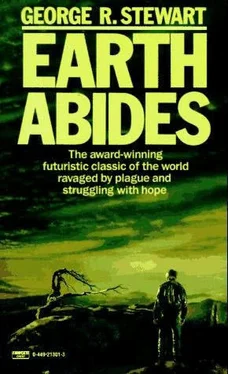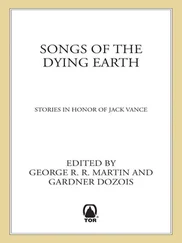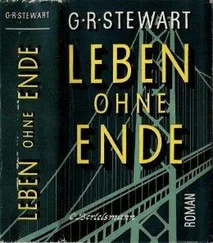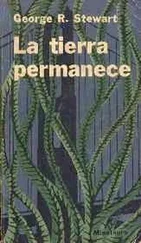His first shock came when he picked up the newspaper. The Chronicle, the one he remembered, was thick—twenty or thirty pages at least. The newspaper he picked up was like a little country weekly, a single folded sheet. It was dated Wednesday of the preceding week.
The headlines told him what was most essential. The United States from coast to coast was overwhelmed by the attack of some new and unknown disease of unparalleled rapidity of spread, and fatality. Estimates for various cities, admittedly little more than guesses, indicated that between 25 percent and 35 percent of the population had already died. No reports, he read, were available for Boston, Atlanta, and New Orleans, indicating that the news-services in those cities had already broken down. Rapidly scanning the rest of the paper, he gained a variety of impressions—a hodge-podge which he could scarcely put together in any logical order. In its symptoms the disease was a kind of super-measles. No one was sure in what part of the world it had originated; aided by airplane travel, it had sprung up almost simultaneously in every center of civilization, outrunning all attempts at quarantine.
In an interview a notable bacteriologist indicated that the emergence of some new disease had always been a possibility which had worried the more far-thinking epidemiologists. He mentioned in the past such curious though minor outbreaks as the English sweat and Q-fever. As for its origin, he offered three possibilities. It might have emerged from some animal reservoir of disease; it might be caused by some new microorganism, most rely a virus, produced by mutation; it might be an escape, possibly even a vindictive release, from some laboratory of bacteriological warfare. The last was apparently the popular idea. The disease was assumed to be airborne, possibly upon particles of dust. A curious feature was that the isolation of the individual seemed to be of no avail.
In an interview conducted by trans-Atlantic telephone, a crusty old British sage had commented, “Man has been growing more stupid for several thousand years; I myself shall waste no tears at his demise.” On the other hand an equally crusty American critic had got religion: “Only faith can save us now; I am praying hourly.”
A certain amount of looting, particularly of liquor stores was reported. On the whole, however, order had been well preserved, possibly through fear. Louisville and Spokane reported conflagrations, out of control because of decimated fire-departments.
Even in what they must have suspected to be their last issue, the gentlemen of the press, however, had not neglected to include a few of their beloved items of curiosity. In Omaha a religious fanatic had run naked through the streets, calling out the end of the world and the opening of the Seventh Seal. In Sacramento a crazed woman had opened the cages of a circus menagerie for fear that the animals might starve to death, and had been mauled by a lioness. Of more scientific interest, the Director of the San Diego zoo reported his apes and monkeys to be dying off rapidly, the other animals unaffected.
As he read, Ish felt himself growing weak with the cumulative piling up of horror and an overwhelming sense of solitude. Yet he still read on, fascinated.
Civilization, the human race—at least, it seemed to have gone down gallantly. Many people were reported as escaping from the cities, but those remaining had suffered, as far as he could make out from the newspaper a week old, no disgraceful panic. Civilization had retreated, but it had carried its wounded along, and had faced the foe. Doctors and nurses had stayed at their posts, and thousands more had enlisted as helpers. Whole areas of cities had been designated as hospital zones and points of concentration. All ordinary business had ceased, but food was still handled on an emergency basis. Even with a third of the population dead, telephone service along with water, light, and power still remained in most cities. In order to avoid intolerable conditions which might lead to a total breakdown of morale, the authorities were enforcing strict regulations for immediate mass burials.
He read the paper, and then read it through again more carefully. There was obviously nothing else he needed to do. When he had finished it a second time, he went out and sat in his car. There was no particular reason, he realized, why he should sit in his own car rather than in some other. There was no more question of property right, and yet he felt more comfortable being where he had been before. (The fat dog walked along the street again, but he did not call to the dog.) He sat there a long time, thinking; rather, he scarcely thought, but his mind seemed merely turning over without getting anywhere.
The sun was nearly down when he roused himself. He started the engine, and drove the car down the street, stopping now and then to blow a blast upon the horn. He turned off into a side street, and made the rounds of the town, blowing the horn methodically. The town was small, and in a quarter of an hour he was back where he had started. He had seen no one, and heard no answer. He had observed four dogs, several cats, a considerable number of scattered hens, one cow grazing in a vacant lot with a bit of broken rope dangling from her neck. Nosing along the doorway of a very decent-looking house, there had been a large rat.
He did not stop in the business district again, but drove on and came to what he now knew to be the best house in town. He got out of the car, carrying the hammer with him. This time he did not hesitate before the locked door; he struck it hard, three times, and it crashed inwards. As he had supposed, there was a large radio in the living-room.
He made a quick round of inspection, downstairs and up. “There’s nobody!” he decided. Then the grim suggestion of the word itself struck him: Nobody—no body!
Feeling the two meanings already coalescing in his mind, he returned to the living-room. He snapped the radio on, and saw that the electricity was still working. He let the tubes warm up, and then searched carefully. Only faint crackles of static impinged on his alerted ear-drums; there was no program. He shifted to the short-wave, but it too was silent. Methodically he searched both bands again. Of course, he thought, some stations might still be operating; they would probably not be on a twenty-four-hour schedule.
He left the radio tuned to a wave-length which was—or had been—that of a powerful station. If it came on at any time, he would hear it. He went and lay on the davenport.
In spite of the horror of the situation he felt a curious spectator’s sense about it all, as if he were watching the last act of a great drama. This, he realized, was characteristic of his personality. He was—had been—was (well, no matter)—a student, an incipient scholar, and such a one was necessarily oriented to observe, rather than to participate.
Thus observing, he even gained a momentary ironic satisfaction by contemplating the catastrophe as a demonstration of a dictum which he had heard an economics professor once propound—“The trouble you’re expecting never happens; it’s always something that sneaks up the other way.” Mankind had been trembling about destruction through war, and had been having bad dreams of cities blown to pieces along with their inhabitants, of animals killed too, and of the very vegetation blighted off the face of the earth. But actually mankind seemed merely to have been removed rather neatly, with a minimum of disturbance. This, he thought vaguely, would offer interesting conditions of life to the survivors, if eventually there were any.
He lay comfortably on the davenport; the evening was warm. Physically he was exhausted from his illness, and he was equally spent emotionally. Soon he was sleeping.
Читать дальше












